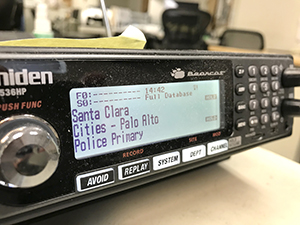
OPINION
May 1, 2023
BY DAVE PRICE
Daily Post Editor
Politicians love to say that they’re in favor of transparency. Well now here’s an opportunity for them to stand up for that principal.
State Sen. Josh Becker, D-Menlo Park, has introduced Senate Bill 719 that would ban encryption of police radio communications statewide.
Of course there would be exceptions, like for undercover operations. But public broadcasts of normal dispatch calls keeps the police more accountable. In emergency situations such as shootings or disasters, it helps the media get accurate and timely information to the public.
The public has been able to listen to police radio transmissions going as far back as the 1920s, according to Becker’s office, which researched the topic.
But that changed in October 2020 when the California Department of Justice issued a memo to local police departments reminding them of existing laws to protect people’s personal information that might go over the air. The memo offered two choices: Encrypt your broadcasts or give out personal information that’s not complete, but enough for an officer to do his job.
In January 2021, then-Palo Alto police chief Robert Jonsen encrypted his agencies frequencies. And a city PR person in an online posting even said that the state had required cities to encrypt, which was false.
In August 2022, a new police chief, Andrew Binder, restored public transmissions of police radio frequencies, a move that showed his desire to be open and transparent.
But according to Becker’s office, about 100 police departments out of 700 that were surveyed have switched to encrypted transmissions. Those departments favoring secrecy include Los Altos, Mountain View and the Santa Clara County Sheriff’s Office. Jonsen is now sheriff, but encryption began there before he was elected.
All of these departments broadcast publicly before 2020.
“My goal is to restore the access the media and the public had to police radio communications for nearly a century up until three years ago when law enforcement agencies were given the option to shut it down,” Becker said.
A similar bill from Becker last year died in the Appropriations Committee after three state agencies claimed it would be too expensive to go back to public communications. Their arguments about the cost seemed exaggerated, but they scared off some legislators.
If Becker’s new bill is to pass, it needs letters of support from cities that say they favor transparency in police radio transmissions. Now would be a good time for Mountain View and Los Altos to switch back to public transmissions, and to send the Legislature a letter saying they favor the public’s right to monitor police communications.
It’s one thing to say you favor transparency, but it’s another to actually take action.
Editor Dave Price’s column appears every Monday in the Post. Email him at [email protected].

This story is getting old and sounds more personal than useful. Can we report more on city improvements and infrastructure.
It’s not personal, it’s existential. Journalism and free press rely on government transparency.
Got to think that you don’t read the paper if you’re complaining about a lack of reporting on city improvements and infrastructure. The Post seems to have a lot of that coverage every day. And it is perfectly appropriate for the Post, or any other newspaper, to publish an editorial calling for more openness when it comes to police communication. A couple of years ago, 100% of the state’s police departments had un-encrypted radio communications. Now 100 out of 700 have encrypted. I know you think this is “getting old and sounds more personal than useful,” but it’s important to people across the state (including Mtn. View and Los Altos) who are losing this way of monitoring their local police departments.
What worker wouldn’t want to protect their routine communications? I mean, having everyone being able to overhear what you say as perform you job is understandably annoying.
But, government operations including law enforcement operate under a different set of rules. “Unfortunately or fortunately”, the State’s sunshine laws provide for transparency and that extends to police communications over public radio spectrum.
The DOJ letter is just an excuse for law enforcement to do what they have always wanted: Operate without fear that someone will see what they are doing.
The antidote, if this legislation fails or police can’t do the right thing, is to barrage the local governments with public records act requests for the recordings. The government can devote an employee to redacting the information the DOJ seeks to protect. One a day until they relent. Government will discover encryption is more costly than anticipated.